 John McLaughlin, a guitarist apart as he proved once and for all in sessions with Miles Davis, spent much of the '60s as an in-demand sideman for the likes of Graham Bond, Georgie Fame, and Jack Bruce, even Bowie, Hendrix, and the Stones. Approximately here is where he started out on his own, though it was the Miles dates and then the Mahavishnu Orchestra where he broke as a star, at least as much of a star as a fusion artist can be. For me, never a fan of notes-per-second, strange time signature noodling, which is how the Mahavishnu stuff sounds to me, this is the album that counts (well, this and those Miles sides) -- all moody layers and washes of smoky, doomy sound, as sure-footed as a muscular feline padding about the place. And, oh yeah, works on some level as a spiritual exercise too. Profoundly moving. Food for the soul. One of a kind, this. One for the ages.
John McLaughlin, a guitarist apart as he proved once and for all in sessions with Miles Davis, spent much of the '60s as an in-demand sideman for the likes of Graham Bond, Georgie Fame, and Jack Bruce, even Bowie, Hendrix, and the Stones. Approximately here is where he started out on his own, though it was the Miles dates and then the Mahavishnu Orchestra where he broke as a star, at least as much of a star as a fusion artist can be. For me, never a fan of notes-per-second, strange time signature noodling, which is how the Mahavishnu stuff sounds to me, this is the album that counts (well, this and those Miles sides) -- all moody layers and washes of smoky, doomy sound, as sure-footed as a muscular feline padding about the place. And, oh yeah, works on some level as a spiritual exercise too. Profoundly moving. Food for the soul. One of a kind, this. One for the ages.
Thursday, June 28, 2007
Devotion (1970)
 John McLaughlin, a guitarist apart as he proved once and for all in sessions with Miles Davis, spent much of the '60s as an in-demand sideman for the likes of Graham Bond, Georgie Fame, and Jack Bruce, even Bowie, Hendrix, and the Stones. Approximately here is where he started out on his own, though it was the Miles dates and then the Mahavishnu Orchestra where he broke as a star, at least as much of a star as a fusion artist can be. For me, never a fan of notes-per-second, strange time signature noodling, which is how the Mahavishnu stuff sounds to me, this is the album that counts (well, this and those Miles sides) -- all moody layers and washes of smoky, doomy sound, as sure-footed as a muscular feline padding about the place. And, oh yeah, works on some level as a spiritual exercise too. Profoundly moving. Food for the soul. One of a kind, this. One for the ages.
John McLaughlin, a guitarist apart as he proved once and for all in sessions with Miles Davis, spent much of the '60s as an in-demand sideman for the likes of Graham Bond, Georgie Fame, and Jack Bruce, even Bowie, Hendrix, and the Stones. Approximately here is where he started out on his own, though it was the Miles dates and then the Mahavishnu Orchestra where he broke as a star, at least as much of a star as a fusion artist can be. For me, never a fan of notes-per-second, strange time signature noodling, which is how the Mahavishnu stuff sounds to me, this is the album that counts (well, this and those Miles sides) -- all moody layers and washes of smoky, doomy sound, as sure-footed as a muscular feline padding about the place. And, oh yeah, works on some level as a spiritual exercise too. Profoundly moving. Food for the soul. One of a kind, this. One for the ages.
Old Skool
(updated 10/18/07: now invitation-only)
A treasure chest of glittering prizes you can haul away by the armful, discographies, almost discographies, and piles of master funk, soul, proto-hiphop albums and artists: Eddie Hazel, Commodores, Isley Brothers, Curtis Mayfield, Brick, Buddy Miles, Hot Chocolate, Jones Girls. You get the idea. This is where I finally found the solo Bernard Edwards album I had been looking for literally for decades. Full albums available indefinitely. Archives worth browsing.
See more great music blogs.
The Progressive Blues Experiment (1969)
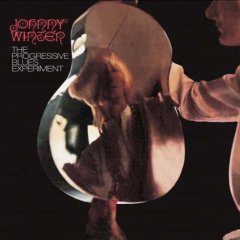 Johnny Winter, another white guy from the '60s playing the blues -- this one so white he is albino. I guess the important thing is he's from Texas and drank that water deep because as he demonstrates on this slightly unofficial debut (as the liner notes pretentiously point out), once he starts to play he becomes the guitar. There's nothing at all wannabe about this, black white or gray. Brother Edgar may have been the rock star of the family, but Johnny was the one with the blues down deep into his soul. He caked that over good with heroin, barbiturates, and alcohol and spiraled out of sight in the mid-'70s. Made it back, produced one of Muddy Waters's best albums, and has spent his life on the road like most any self-respecting bluesman. But I'm not convinced any album of his is superior to this.
Johnny Winter, another white guy from the '60s playing the blues -- this one so white he is albino. I guess the important thing is he's from Texas and drank that water deep because as he demonstrates on this slightly unofficial debut (as the liner notes pretentiously point out), once he starts to play he becomes the guitar. There's nothing at all wannabe about this, black white or gray. Brother Edgar may have been the rock star of the family, but Johnny was the one with the blues down deep into his soul. He caked that over good with heroin, barbiturates, and alcohol and spiraled out of sight in the mid-'70s. Made it back, produced one of Muddy Waters's best albums, and has spent his life on the road like most any self-respecting bluesman. But I'm not convinced any album of his is superior to this.
Friday, June 22, 2007
Hallelujah (1969)
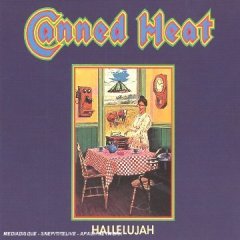 As a band, not to mention as a phenomenon of the '60s and spawn equally of the Monterey Pop Festival and Woodstock, Canned Heat actually had a lot going for it. If you didn't like Bob "The Bear" Hite trying to do Muddy Waters, you could go for Al "Blind Owl" Wilson doing ... well, where did that eerie, thing of beauty falsetto come from anyway? "Boogie" anyway remained the byword, even past its rightful use-by date, and it can't be much of a surprise that John Lee Hooker's first and perhaps most successful collaboration with a Rock band came with these guys. Long story short: a consistently fine, high-spirited band. And really, most of their albums are worth the time (at least through late 1970's Hooker 'N' Heat, after which I can't vouch). This one's as good a place as any to start. You might be surprised.
As a band, not to mention as a phenomenon of the '60s and spawn equally of the Monterey Pop Festival and Woodstock, Canned Heat actually had a lot going for it. If you didn't like Bob "The Bear" Hite trying to do Muddy Waters, you could go for Al "Blind Owl" Wilson doing ... well, where did that eerie, thing of beauty falsetto come from anyway? "Boogie" anyway remained the byword, even past its rightful use-by date, and it can't be much of a surprise that John Lee Hooker's first and perhaps most successful collaboration with a Rock band came with these guys. Long story short: a consistently fine, high-spirited band. And really, most of their albums are worth the time (at least through late 1970's Hooker 'N' Heat, after which I can't vouch). This one's as good a place as any to start. You might be surprised.
Thursday, June 21, 2007
Diddy Wah
This blog, whose name I like to think comes from Captain Beefheart, has been around a few years, stewing up a reg'lar brew of roots, garage, soul, rockabilly, and more. Posting occasionally becomes infrequent and even at top speed updates are weekly at best. But it's worth checking frequently. Single tracks available for a limited time.
See more great music blogs.
Tuesday, June 19, 2007
Ten Years After (1967)
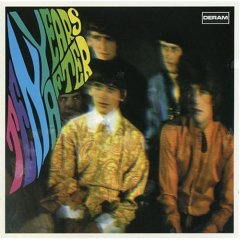 I suppose I should start with the easy joke about how now they should be called Forty Years After, something like that. Moving along, I am always surprised by the confidence and poise of this debut, lost in the roaring acclaim of the follow-up live Undead and what became their signature song, "I'm Going Home," on which Alvin Lee demonstrated how quickly he could move his fingers and with such coordination and precision, and which act he took to Woodstock. And so they became rock stars and released some baker's dozen LPs over the years until now. The only one of them that I care about, the fallback position throughout this one is a kind of smoky roadhouse jazz -- a Hammond organ taking lead on many of the tracks, the vocals surprisingly understated, and a really tidy, efficient rhythm section. Everything moves forward constantly, and it all ends too soon.
I suppose I should start with the easy joke about how now they should be called Forty Years After, something like that. Moving along, I am always surprised by the confidence and poise of this debut, lost in the roaring acclaim of the follow-up live Undead and what became their signature song, "I'm Going Home," on which Alvin Lee demonstrated how quickly he could move his fingers and with such coordination and precision, and which act he took to Woodstock. And so they became rock stars and released some baker's dozen LPs over the years until now. The only one of them that I care about, the fallback position throughout this one is a kind of smoky roadhouse jazz -- a Hammond organ taking lead on many of the tracks, the vocals surprisingly understated, and a really tidy, efficient rhythm section. Everything moves forward constantly, and it all ends too soon.
Saturday, June 16, 2007
James Bond
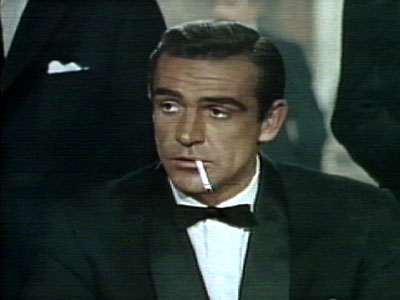 007 James Bond
007 James BondI have the honest to God hardest time pinning down what exactly is so unmistakable about James Bond music. There's the chick factor, of course, and what a line-up: Shirley Bassey (the Bond girl), Nancy Sinatra, Tina Turner, Lulu, Gladys Knight, Carly Simon, Sheena Easton, Rita Coolidge (don't that make your brown eyes blue?), Sheryl Crow, Shirley Manson (do I have to say Garbage?), Tom Jones, Paul McCartney, a-ha, Duran Duran. Wait a minute. But that's just the glam factor; essential, though not musical. What is it? Horns come and go. Strings come and go. Twangy guitar comes and goes. Synth keybs and beatboxes come and go. Well, that swooping, soaring, swelling, impossibly sweet and drunken kind of thing is usually there, most often opening big on the chorus. Maybe that's it. But I have a feeling there's something technical in the songwriting too -- certain chord changes, or something about minor keys. I just don't have the vocabulary. P.S. BTW FYI Caveat and something you should know: I can't stand the movies, the few that I've seen. Sorry about that, chief.
Carly Simon, "Nobody Does It Better" (1977, #2) (3:29)
Garbage, "The World Is Not Enough" (1999) (3:56)
Gladys Knight, "Licence to Kill" (1989) Floats in like a big boat. (5:15)
John Barry Orchestra, "James Bond Theme" (1962) The shit. From Dr. No. (1:47)
John Barry Orchestra, "On Her Majesty's Secret Service" (1969) Mental. Only theme that's an instrumental. (2:35)
Louis Armstrong, "We Have All the Time in the World" (1969) This one sneaks up on you. (3:15)
My Life with the Thrill Kill Kult, "Sex on Wheelz" (1992) I'm including this because somehow it sounds like a James Bond theme to me (admittedly distorted and perverted). Maybe it uses the same mysterious musical thing? Maybe I'm just wrong? (4:59)
Nancy Sinatra, "You Only Live Twice" (1967) (2:46)
More information in comments.
Thursday, June 14, 2007
Chocoreve
Chocoreve: One of the first (that I encountered anyway) and certainly one of the best for obscure late '60s/early '70s product and bootleg, the era of psychedelia bleeding into classic rock. One of the greats. Full albums available indefinitely. The password, btw, is posted_first_at_chocoreve.
See more great music blogs.
Music bloggers: Please feel free to add your latest updates in comments.
Wednesday, June 13, 2007
Only Life (1988)
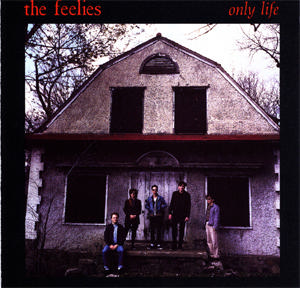 The third album from the Feelies in eight years insinuates with a rich and warm sound that unfortunately strains for a gravitas they don't need and never needed, except simply by way of what had been acquired naturally across the years. I found this in the slush pile at an alternative newsweekly where I was freelancing. I think the editor considered repossessing it when he saw my excitement at finding it there. Instead, he made me take the copy of R.E.M.'s major label debut Green too and write about that. I wanted to write about this, not that, so I wrote about both, thrashing through with an incoherent batch of theories about the Byrds and the Velvet Underground. A friend of his from San Francisco called and told him I was full of shit. Hey, I was the one with the album. But as a result the editor wouldn't let me review Lou Reed's New York like he said he would. Fortunately for me, I'd already nicked the promo and he had to go out to a store and expense a copy at the last minute. That's life.
The third album from the Feelies in eight years insinuates with a rich and warm sound that unfortunately strains for a gravitas they don't need and never needed, except simply by way of what had been acquired naturally across the years. I found this in the slush pile at an alternative newsweekly where I was freelancing. I think the editor considered repossessing it when he saw my excitement at finding it there. Instead, he made me take the copy of R.E.M.'s major label debut Green too and write about that. I wanted to write about this, not that, so I wrote about both, thrashing through with an incoherent batch of theories about the Byrds and the Velvet Underground. A friend of his from San Francisco called and told him I was full of shit. Hey, I was the one with the album. But as a result the editor wouldn't let me review Lou Reed's New York like he said he would. Fortunately for me, I'd already nicked the promo and he had to go out to a store and expense a copy at the last minute. That's life.
Monday, June 11, 2007
Crazy Rhythms (1980)
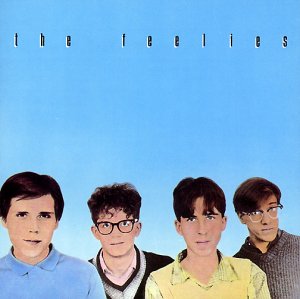 The bashful self-consciousness with which these artistes approach the business at hand strays now and then into painful realms. Crying out loud, they can't even manage to push vocals through the microphone with much of anything like confidence. But it doesn't matter. Once they get down to hitting the groove it's easy to forgive them anything. The impossibly fast chording drives the proceedings forward at breakneck pace, and speaking of rhythms, every member of the band gets at least one percussion credit. At the same time it remains under control all the way through, which says to me they know exactly what they're doing here. It operates at a fairly primal level, even though they are white, bashful, and arguably responsible for the genre now known as "indie rock." That's a stretch, but how can you call this "punk" or "new wave," let alone "rock"? But that doesn't matter either. So just turn it up and twitch along.
The bashful self-consciousness with which these artistes approach the business at hand strays now and then into painful realms. Crying out loud, they can't even manage to push vocals through the microphone with much of anything like confidence. But it doesn't matter. Once they get down to hitting the groove it's easy to forgive them anything. The impossibly fast chording drives the proceedings forward at breakneck pace, and speaking of rhythms, every member of the band gets at least one percussion credit. At the same time it remains under control all the way through, which says to me they know exactly what they're doing here. It operates at a fairly primal level, even though they are white, bashful, and arguably responsible for the genre now known as "indie rock." That's a stretch, but how can you call this "punk" or "new wave," let alone "rock"? But that doesn't matter either. So just turn it up and twitch along.
Friday, June 08, 2007
154 (1979)
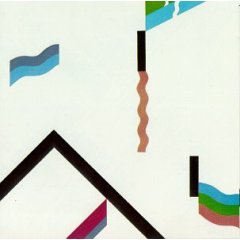 Back where I'm from the Wire debate always came down to this album versus Pink Flag, and for me it was never a question -- this one, all the way. No short song conceits, just raw blasts of jagged sound describing and demarcating any number of strange spaces complete with height, width, and depth, big enough to step into, if you wanted. Anxiety remains the order of the day and it didn't help (or should I say hurt) that throughout it's as convincing, incoherent, and overwhelmingly powerful as it is methodical and tidy. Every shred of feedback, every ringing chord, every frog-bass croak from the singer remains numbing, exhilarating, and bone-chilling. It's also tuneful. Art-rock this good should be against the law?
Back where I'm from the Wire debate always came down to this album versus Pink Flag, and for me it was never a question -- this one, all the way. No short song conceits, just raw blasts of jagged sound describing and demarcating any number of strange spaces complete with height, width, and depth, big enough to step into, if you wanted. Anxiety remains the order of the day and it didn't help (or should I say hurt) that throughout it's as convincing, incoherent, and overwhelmingly powerful as it is methodical and tidy. Every shred of feedback, every ringing chord, every frog-bass croak from the singer remains numbing, exhilarating, and bone-chilling. It's also tuneful. Art-rock this good should be against the law?
Thursday, June 07, 2007
bumrocks
All things cool (and I mean that in the strictest McLuhanesque sense) converge on super-saturated red planet bumrocks, where techno meets fusion meets soul meets new age meets tropicalia. Don't miss this one if you can. Single tracks available for a limited time.
Visit more great music blogs.
Music bloggers: Please feel free to add your latest updates in comments.
Wednesday, June 06, 2007
Chairs Missing (1978)
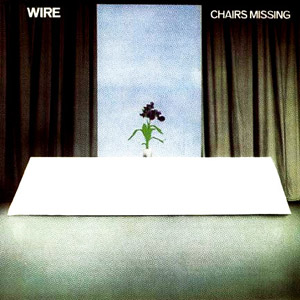 Maybe it has something to do with the alphabet, maybe with a general disinclination toward the product of Brits, but a number of good to great albums from the likes of Wire, XTC, and/or Young Marble Giants escaped my attention in their heyday. I missed this one so completely that I was surprised to learn even of its existence a few years ago. The confluence of punk and art continued apace as Wire principals became ever more adept at writing songs, playing their instruments, and maximizing advantages of a recording studio. You can go ahead and envy me my late-arriving encounter -- hearing it at last has been an experience similar to hearing VU in 1985 -- or pity me for missing it so long. If you haven't heard it, don't make the mistake that I did. Trying to help you here.
Maybe it has something to do with the alphabet, maybe with a general disinclination toward the product of Brits, but a number of good to great albums from the likes of Wire, XTC, and/or Young Marble Giants escaped my attention in their heyday. I missed this one so completely that I was surprised to learn even of its existence a few years ago. The confluence of punk and art continued apace as Wire principals became ever more adept at writing songs, playing their instruments, and maximizing advantages of a recording studio. You can go ahead and envy me my late-arriving encounter -- hearing it at last has been an experience similar to hearing VU in 1985 -- or pity me for missing it so long. If you haven't heard it, don't make the mistake that I did. Trying to help you here.
Monday, June 04, 2007
Pink Flag (1977)
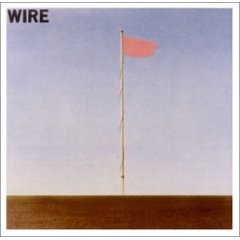 Although in their origins Wire was contemporary with British punk-rock they are actually much more of an art-rock outfit and always have been, as this conceptual debut amply demonstrates. Among the first to exploit the self-consciously short (minute and a half or less) song -- think also Ramones, Vibrators, or Minutemen -- Wire nonetheless pretty much confines that particular exercise to this album alone of theirs. Other features for which they became known are already abundantly in evidence: the crunchy and throbbing attack, with no lack of dead stops and starts, and the proceedings frequently stripped down to basic elements of feedback, yelpy vocals, in-your-face reverb, obdurate lyrical concerns, and/or minor-key tunefulness. Yet no matter how wild it may get a crust of civilization remains always. It's a pretty neat trick.
Although in their origins Wire was contemporary with British punk-rock they are actually much more of an art-rock outfit and always have been, as this conceptual debut amply demonstrates. Among the first to exploit the self-consciously short (minute and a half or less) song -- think also Ramones, Vibrators, or Minutemen -- Wire nonetheless pretty much confines that particular exercise to this album alone of theirs. Other features for which they became known are already abundantly in evidence: the crunchy and throbbing attack, with no lack of dead stops and starts, and the proceedings frequently stripped down to basic elements of feedback, yelpy vocals, in-your-face reverb, obdurate lyrical concerns, and/or minor-key tunefulness. Yet no matter how wild it may get a crust of civilization remains always. It's a pretty neat trick.
Subscribe to:
Posts (Atom)
